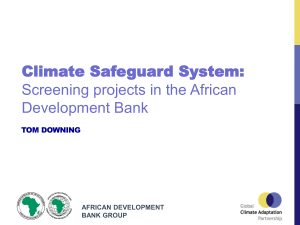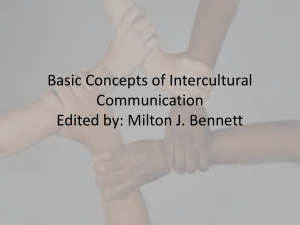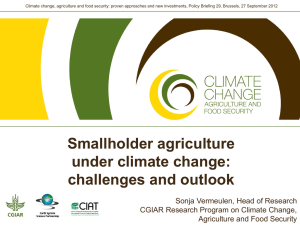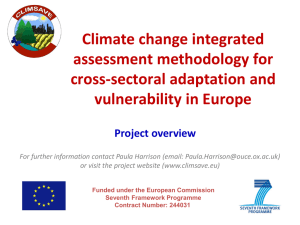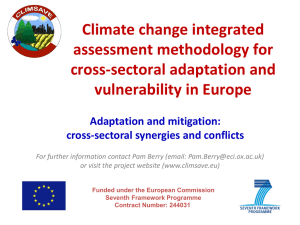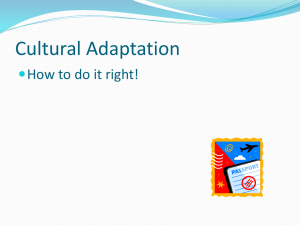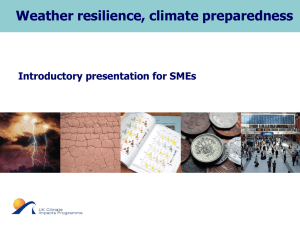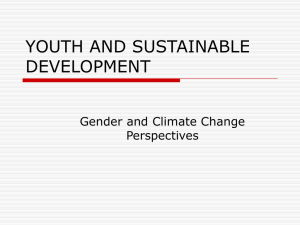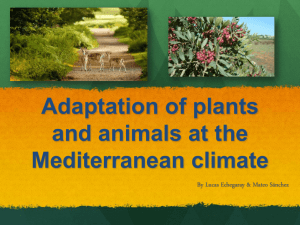CLIMSAVE_Socio-economic_Scenarios_Presentation
advertisement
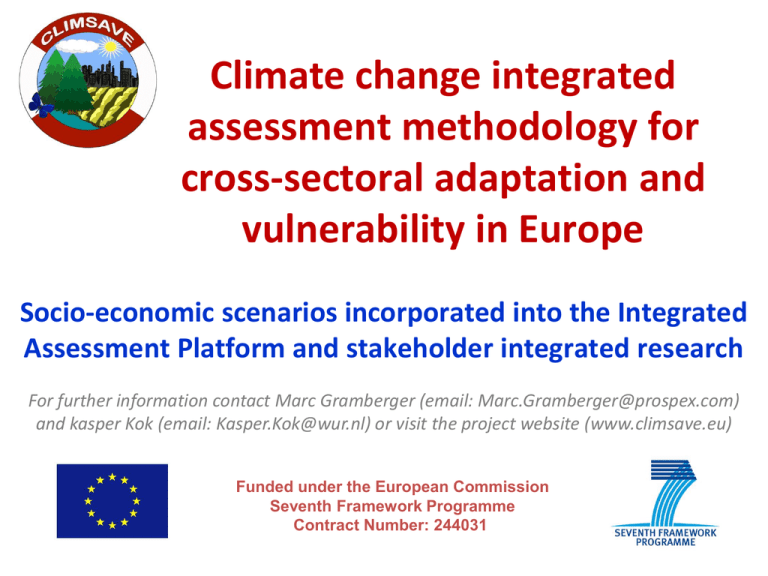
Climate change integrated assessment methodology for cross-sectoral adaptation and vulnerability in Europe Socio-economic scenarios incorporated into the Integrated Assessment Platform and stakeholder integrated research For further information contact Marc Gramberger (email: Marc.Gramberger@prospex.com) and kasper Kok (email: Kasper.Kok@wur.nl) or visit the project website (www.climsave.eu) Funded under the European Commission Seventh Framework Programme Contract Number: 244031 Climate Change Integrated Methodology for Cross-Sectoral Adaptation and Vulnerability in Europe Scenarios …help us to understand the different ways in which the future might develop. …can be utilised to evaluate and change current thinking and improve decision-making. … are developed in the CLIMSAVE project to integrate knowledge and enhance solutions-oriented ‘out of the box’ thinking across: www.CLIMSAVE.eu – expertise areas (stakeholders and researchers) – disciplines – a wider range of factors, sectors and actors … have been developed in the CLIMSAVE project as socioeconomic scenarios using the Story-And-Simulation (SAS) approach, separate from Climate Change projections. Climate Change Integrated Methodology for Cross-Sectoral Adaptation and Vulnerability in Europe Story-And-Simulation approach www.CLIMSAVE.eu Qualitative stories developed by stakeholders are iteratively linked to quantitative models. Socio-economic scenarios are developed during stakeholder workshops using expert-determined methods and guided by professional facilitators. Climate Change Integrated Methodology for Cross-Sectoral Adaptation and Vulnerability in Europe Socio-economic scenarios • Sketch a number of credible future outlooks of socioeconomic developments, and their potential effects on climate change adaptation. • Were developed together with stakeholders through a series of workshops: www.CLIMSAVE.eu – 3 workshops on the European level with a carefully defined cross-European selection of stakeholders; – 3 workshops on a regional level with Scotland as the case study and with a carefully defined cross-selection of Scottish stakeholders; – 1 shared learning and exchange session between the European and Scottish levels. Climate Change Integrated Methodology for Cross-Sectoral Adaptation and Vulnerability in Europe CLIMSAVE stakeholder workshops Workshop Date Europe – Workshop 1 10 - 12 May 2011 Bruges, Belgium Europe – Workshop 2 6 - 8 February 2012 Prague, Czech Republic Participants Main aims (number) 19 1. Qualitative scenario development 2. Quantification of key variables 11 1. Finalisation of storylines 2. Review quantitative variables 3. Identify adaptation options www.CLIMSAVE.eu Europe – Workshop 3 3 - 4 December 2012 Edinburgh, UK 12 1. Interacting with the Integrated Assessment Platform 2. Developing and testing adaptation options and strategies 3. Assess and discuss multi-scale robustness of options (jointly done with participants from the Scottish case) Scotland – Workshop 1 27 - 28 June 2011 Edinburgh, UK 24 1. Qualitative scenario development 2. Quantification of key variables Scotland – Workshop 2 27 - 28 February 2012 Edinburgh, UK 19 1. Finalisation of storylines 2. Review quantitative variables 3. Identify adaptation options Scotland – Workshop 3 3 - 4 December 2012 Edinburgh, UK 15 1. Interacting with the Integrated Assessment Platform 2. Developing and testing adaptation options and strategies 3. Assess and discuss multi-scale robustness of options (jointly done with participants from the European case) Source: Gramberger et al. (2013) Stakeholder Integrated Research (STIR): A new approach tested in climate change adaptation research. Climatic Change (under review). Climate Change Integrated Methodology for Cross-Sectoral Adaptation and Vulnerability in Europe Stakeholder Integrated Research www.CLIMSAVE.eu Source: Gramberger et al. (2013) Stakeholder Integrated Research (STIR): A new approach tested in climate change adaptation research. Climatic Change (under review). Climate Change Integrated Methodology for Cross-Sectoral Adaptation and Vulnerability in Europe Stakeholder Integrated Research (2) • Results in CLIMSAVE: – Developing qualitative scenarios in the form of stories enables developing valuable results in a participatory process involving a broad range of stakeholders from different backgrounds, expertise and professions; – The qualitative scenarios are an excellent basis to stimulate discussion, shared learning and ultimately identification of solutions to climate change adaptation challenges; and www.CLIMSAVE.eu – Stakeholders quantify the resulting stories, which serve as an important input for the modelling in the CLIMSAVE Integrated Assessment Platform, bringing together quantitative projections and qualitative storylines. Climate Change Integrated Methodology for Cross-Sectoral Adaptation and Vulnerability in Europe European CLIMSAVE scenarios www.CLIMSAVE.eu Climate Change Integrated Methodology for Cross-Sectoral Adaptation and Vulnerability in Europe Scottish CLIMSAVE scenarios www.CLIMSAVE.eu Climate Change Integrated Methodology for Cross-Sectoral Adaptation and Vulnerability in Europe Results: Stories www.CLIMSAVE.eu Climate Change Integrated Methodology for Cross-Sectoral Adaptation and Vulnerability in Europe Results: Dynamics and graphs www.CLIMSAVE.eu Dynamics for GDP – Should I Stay or should I Go scenario Cognitive Map – We are the World scenario Climate Change Integrated Methodology for Cross-Sectoral Adaptation and Vulnerability in Europe Results: Model parameter estimates www.CLIMSAVE.eu Climate Change Integrated Methodology for Cross-Sectoral Adaptation and Vulnerability in Europe Results: Incorporation in the IA Platform www.CLIMSAVE.eu Climate Change Integrated Methodology for Cross-Sectoral Adaptation and Vulnerability in Europe Results: Robust adaptation options www.CLIMSAVE.eu Climate Change Integrated Methodology for Cross-Sectoral Adaptation and Vulnerability in Europe Stakeholder satisfaction • Stakeholders generally agreed that the scenario-building process as a whole was useful for developing climate change adaptation strategies: www.CLIMSAVE.eu Climate Change Integrated Methodology for Cross-Sectoral Adaptation and Vulnerability in Europe Stakeholder satisfaction (2) • Across all three workshops the professional facilitation was very positively evaluated by both European as well as Scottish stakeholders: www.CLIMSAVE.eu Climate Change Integrated Methodology for Cross-Sectoral Adaptation and Vulnerability in Europe Recommendations • Stakeholder Integrated Research is able to tackle challenges for stakeholder involvement in scientific research: www.CLIMSAVE.eu – Enables a very close link between stakeholder contribution and research through participatory integration of stakeholders in the research process; – Provides successful identification and selection of stakeholders; – Enables stakeholders to provide substantial insights and useful knowledge and perspective relevant to the scientific endeavor through the design and professional facilitation of the engagement process; and – Enables to maintain stakeholder interest during the entire engagement process. Climate Change Integrated Methodology for Cross-Sectoral Adaptation and Vulnerability in Europe Recommendations (results) • The Story-And-Simulation approach was largely successfully implemented. • Stories remain a crucial product. • Additional products were highly complementary and therefore useful. • Most adaptation options were related to natural and manufactured capital. www.CLIMSAVE.eu

